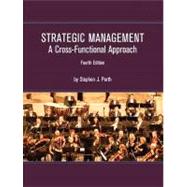
Note: Supplemental materials are not guaranteed with Rental or Used book purchases.
Purchase Benefits
What is included with this book?
Dr. Stephen Porth is associate dean of the Haub School of Business at Saint Joseph’s University and a professor of management. He holds a PhD in business administration and strategy from Temple University, an MBA in marketing from Drexel University, and a BS in management from Saint Joseph’s. His research and teaching interests are in the areas of strategic management, leadership, management consulting, and business ethics. His research has been published extensively in management journals and he has written three books on strategy.
CHAPTER 1 Strategic Management: An Overview
Chapter Learning Objectives
What is Strategic Management?
The Nature of the Strategic Process
Social Responsibility and Ethics The Benefits of Strategic ManagementConclusion
Key Terms and Concepts
Discussion Questions
Experiential Exercise
Endnotes
CHAPTER 2 Creating Value: A Strategic Imperative
Chapter Learning Objectives
The Importance of Value Creation
Value for CustomersValue Disciplines as Paths to Market Leadership
Employees and Value Creation
Owners and Value Creation
Emerging Technologies and Value Creation
Conclusion
Key Terms and Concepts
Discussion Questions
Experiential Exercise
Endnotes
CHAPTER 3 Developing a Mission & Understanding Strategy
Chapter Learning Objectives
Core Values, Mission and Vision
The Elements of Strategy
Strategy and Performance
The Internet and E-Business Initiatives
Conclusion
Key Terms and Concepts
Discussion Questions
Experiential Exercise
Endnotes
CHAPTER 4 The Internal Audit
Chapter Learning Objectives
The Internal Audit Process
Stage 1: Assessment of PerformanceStage 2: Analysis of Value Chain Activities and Linkages
Stage 3: Understanding Core CompetenciesStage 4: Identifying Strengths and Weaknesses
Conclusion
Key Terms and Concepts
Discussion Questions
Experiential Exercise
Endnotes
CHAPTER 5 The External Audit
Chapter Learning Objectives Environment-Organization RelationshipThe Segments of the External Environment
The External Audit ProcessConclusion
Key Terms and Concepts
Discussion Questions
Experiential Exercise
Endnotes
CHAPTER 6 Setting Objectives and Making Strategic Choices
Chapter Learning Objectives
Focusing on Strategic Issues
Setting Strategic Objectives
Strategic Choice
Corporate Level Strategic Choice
Business Level Strategic Choice
Competitive Dynamics and Strategic Choice
International Dimensions of Strategic Choice
Behavioral Aspects of Strategic Choice
Conclusion
Key Terms and Concepts
Discussion Questions
Experiential Exercise
Endnotes
CHAPTER 7 Financial Tools for Strategic Choice
Chapter Learning Objectives
The Finance Function in Strategic Management
Acquiring Funding for Strategic Initiatives
Financial Tools for Strategic Choice
Business Valuation: Determining What a Firm is Worth
Conclusion
Key Terms and Concepts
Discussion Questions
Experiential Exercise
Endnotes
CHAPTER 8 Strategy Implementation: Leading People & ChangeChapter Learning Objectives
Who Is Responsible for Strategy Implementation?
The Strategy Implementation Process
The Role of Organizational Culture in Implementation Why Does Implementation Fail?Successful Strategy Implementation: The People Issues
Conclusion
Key Terms and Concepts
Discussion Questions
Experiential Exercise
Endnotes
Appendix 8A: The Future Search Model
CHAPTER 9 Strategy Implementation: Managing the Organizational Issues
Chapter Learning Objectives
Keys to Successful Implementation: The Organizational Issues
Project Management The Role of Organizational Alignment in Strategy Implementation Strategy and Organizational Design International Aspects of Strategy ImplementationStrategy Implementation: An Example
Conclusion
Key Terms and Concepts
Discussion Questions
Experiential Exercise
Endnotes
CHAPTER 10 Assessing Value Creation
Chapter Learning Objectives
Measuring Value Creation: Two Approaches
A Framework for Assessing Value CreationConclusion
Key Terms and Concepts
Discussion Questions
Experiential Exercise
Endnotes
The New copy of this book will include any supplemental materials advertised. Please check the title of the book to determine if it should include any access cards, study guides, lab manuals, CDs, etc.
The Used, Rental and eBook copies of this book are not guaranteed to include any supplemental materials. Typically, only the book itself is included. This is true even if the title states it includes any access cards, study guides, lab manuals, CDs, etc.